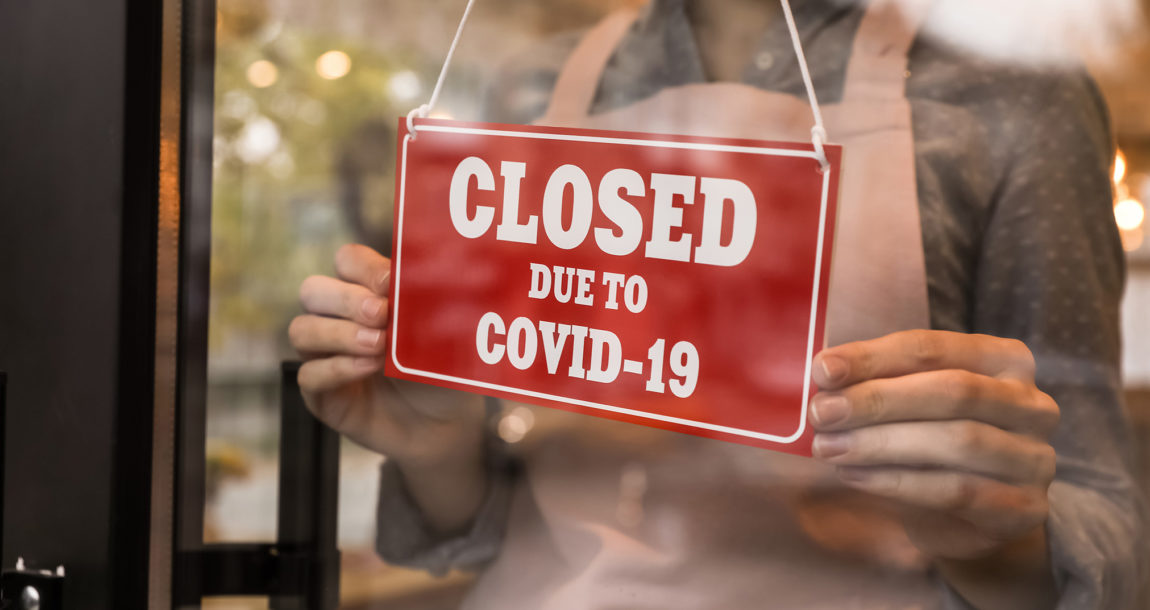Insurers (mostly) successful on COVID-19 business interruption lawsuits

Insurers were mostly victorious in the initial business interruption lawsuits filed in the wake of the COVID-19 shutdowns that began in March 2020.
Those rulings mainly came from federal courts. Now class-action lawsuits are wending their way through state supreme courts, where insurers are getting more good news.
"Insurers had a fair amount of success in defeating these claims in federal court," said Ali I. Haque, partner at BakerHostetler, a national law firm. "What we're starting to see is state supreme courts are now chiming in, after a lot of the cases started to go the insurers way."
BakerHostetler hosted a webinar Tuesday updating trends and outcomes in a variety of class-action topics and cases. Haque was joined by associate Kevin P. Zimmerman in discussing insurance lawsuit trends.
The cumulative number of lawsuits filed for "direct physical loss or damage" from COVID-19 has leveled off just short of 2,500, Haque explained, citing University of Pennsylvania's litigation tracker.
The pandemic government shutdown orders "spurred a lot of litigation regarding whether loss of business income as a result of COVID, or these government shutdown orders, would qualify as a direct physical loss or damage under commercial general liability policies," Haque said. "We're starting to see some patterns develop both in the federal and state courts."
Two big cases
Haque summarized a pair of recent state court decisions – one that went to the insurer, and one that leaves the door open. In the first, the Washington Supreme Court unanimously ruled against a dental practice in Hill and Stout v. Mutual of Enumclaw Insurance Co.
The court ruled that there was no direct physical loss, a requirement of its coverage. “It is unreasonable to read ‘direct physical loss of …property’ in a property insurance policy to include constructive loss of intended use of property,” the ruling said. The dental practice “was still able to physically use the property at issue.”
The second case left some question in a murky decision. The Vermont Supreme Court reversed a lower court ruling and restored Huntington Ingalls Industries' lawsuit to get COVID-19 business interruption coverage from Chubb, Berkshire Hathaway and other insurers.
The nation's largest shipbuilder, Huntington Ingalls claimed that its COVID-19-positive employees spread droplets on property surfaces, which delayed to halted company operations.
“We are inclined to allow experts and evidence to come in to evaluate the validity of insured’s novel legal argument before dismissing this case,” Justice Harold Eaton wrote. “We cannot say ‘beyond doubt’ that the virus does not physically damage surfaces in the way insured alleges.”
While the case is noteworthy, Haque is not convinced it will set any new precedent for insurers to be concerned about.
"Ultimately, I think these decisions are very much minority positions," he said. "Most courts, federal and state, have held that the virus, or the government shutdowns, did not qualify as direct physical loss."
Favorable Ohio ruling
Things went better for insurers in Ohio, where a judge sided with Cincinnati Insurance Co. in a lawsuit brought by Neuro-Communication Services. BakerHostetler was involved in this case on behalf of Cincinnati, Haque said.
According to court documents, the Ohio-based Neuro Communication Services had an all-risk commercial-property insurance policy issued by Cincinnati Insurance. Neuro operates an audiology practice under the name Hearing Innovations and ceased nearly all operations from March 23, 2020 to May 4, 2020.
As other insurers did, Cincinnati denied Neuro's claim because it did not involve a physical loss to the property.
In a key ruling, the Ohio Supreme Court decision found that "direct physical loss" or "damage to property" that could potentially trigger coverage under a commercial policy does not arise from:
- The general presence of COVID-19 in the community;
- The presence of COVID-19 on surfaces on items within a restaurant or a building;
- Or the presence of someone who is infected by COVID 19.
"The court's decision really is a pretty sweeping victory for insurers in Ohio," Haque said. "I think the trend is very clear at this point that viruses generally will not constitute a direct physical loss, and that there will be no coverage under [commercial general liability] policies."
InsuranceNewsNet Senior Editor John Hilton has covered business and other beats in more than 20 years of daily journalism. John may be reached at john.hilton@innfeedback.com. Follow him on Twitter @INNJohnH.
© Entire contents copyright 2023 by InsuranceNewsNet.com Inc. All rights reserved. No part of this article may be reprinted without the expressed written consent from InsuranceNewsNet.com.





When advisors communicate about retirement, study says ‘use your words’
Unpacking the IUL marketing plague
Advisor News
- Americans increasingly worried about new tariffs, worsening inflation
- As tariffs roil market, separate ‘signal from the noise’
- Investors worried about outliving assets
- Essential insights a financial advisor needs to grow their practice
- Goldman Sachs survey identifies top threats to insurer investments
More Advisor NewsAnnuity News
- AM Best Comments on the Credit Ratings of Talcott Financial Group Ltd.’s Subsidiaries Following Announced Reinsurance Transaction With Japan Post Insurance Co., Ltd.
- Globe Life Inc. (NYSE: GL) is a Stock Spotlight on 4/1
- Sammons Financial Group “Goes Digital” in Annuity Transfers
- Somerset Reinsurance Announces the Appointment of Danish Iqbal as CEO
- Majesco Announces Participation in LIMRA 2025: Showcasing Cutting-Edge Innovations in Insurance Technology
More Annuity NewsHealth/Employee Benefits News
- ‘They won’t help me’: Sickest patients face insurance denials despite policy fixes
- Thousands of Missouri construction workers with Anthem health insurance left scrambling
- Don't let death penalty turn Luigi Mangione into a martyr
- More than 5M could lose Medicaid coverage if feds impose work requirements
- Don't make Mangione a martyr
More Health/Employee Benefits NewsLife Insurance News
- Who's who in Lori Vallow Daybell's trial in Arizona?
- 2024 ModeSlavery Report (bpcc modeslavery report 2024 en final)
- Exemption Application under Investment Company Act (Form 40-APP/A)
- Annual Report 2024
- Revised Proxy Soliciting Materials (Form DEFR14A)
More Life Insurance News